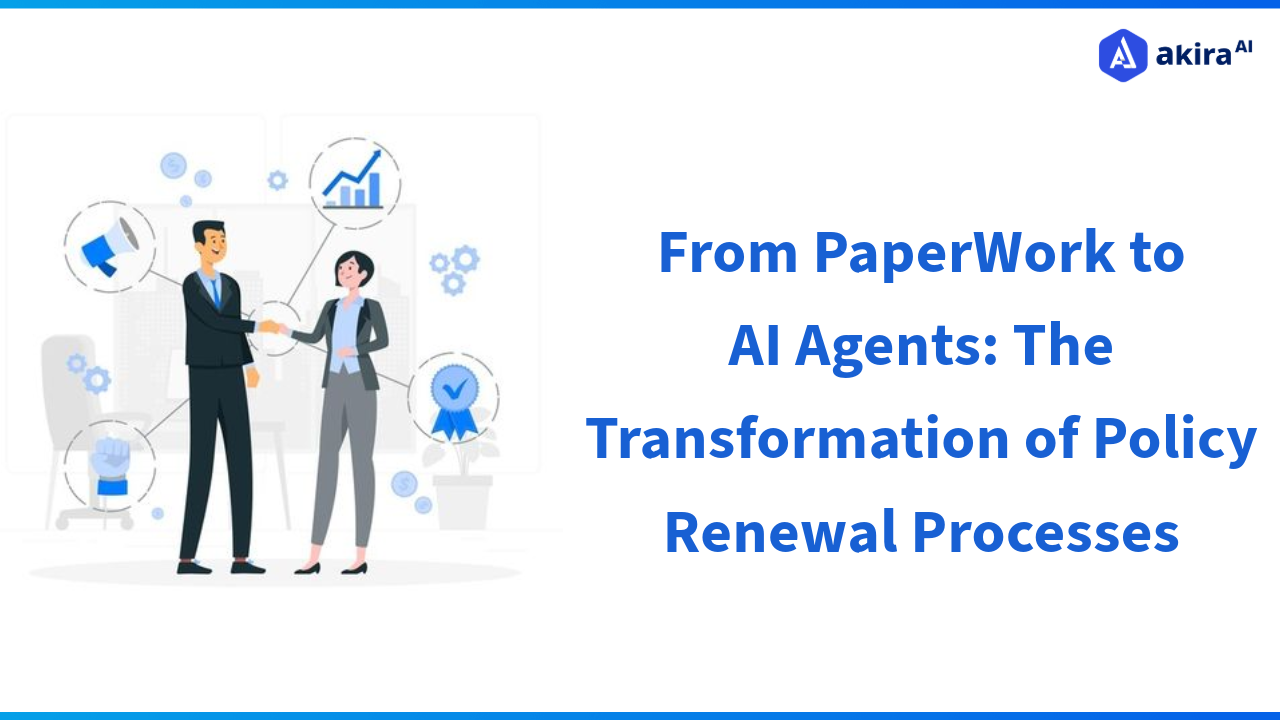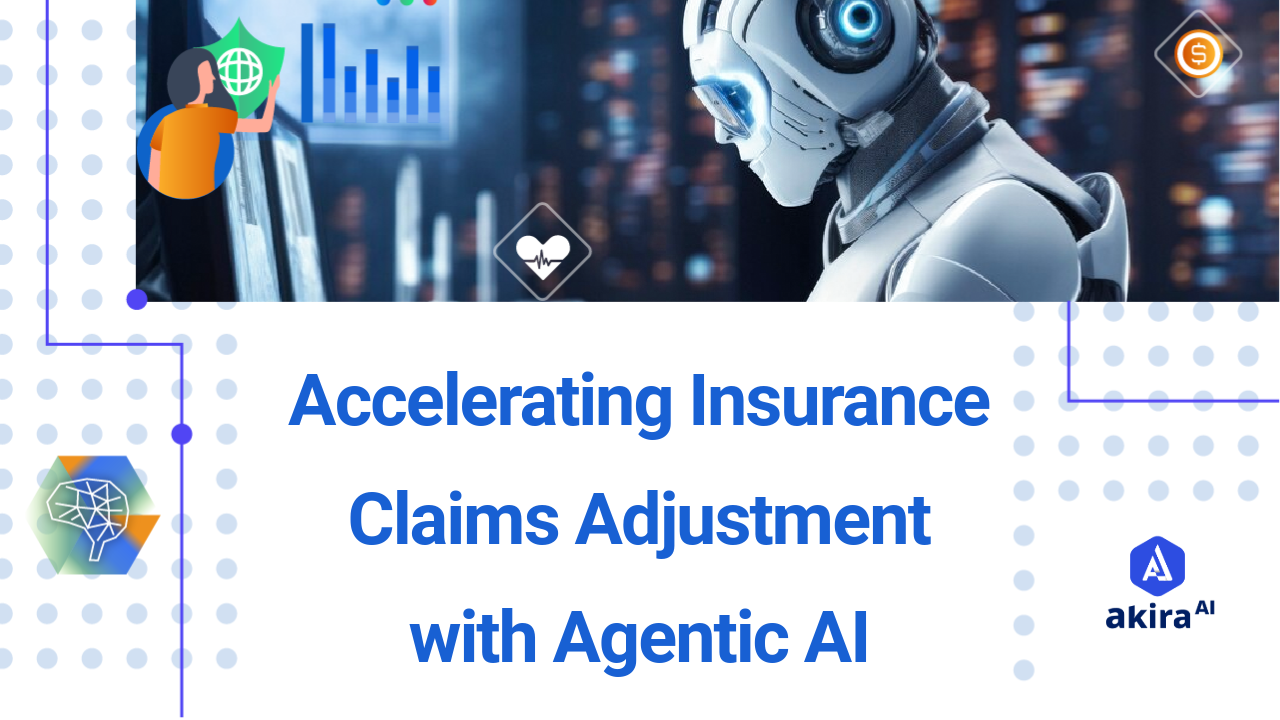Key Insights
Agentic AI-powered loan underwriting and mortgage approval are transforming the insurance and financial industries by enhancing speed, accuracy, and efficiency. Automated systems streamline credit assessments, risk evaluations, and fraud detection, resulting in faster, more reliable decisions. These technologies also enable personalized loan offers tailored to individual financial profiles, improving customer satisfaction.

The mortgage application process has been marred with complications by paperwork, time-consuming analyses, and slow approval processes. However, what if we could cut through all this red tape and make the process faster, more accurate, and highly efficient? With the rise of AI-based loan approval and automated loan underwriting, this is becoming a reality. Powered by agentic AI, every step of the mortgage process— from pre-approval to final approval— happens quickly, with fewer mistakes and much more precision.
AI-driven systems allow for risk assessments, compliance, and creditworthiness of customers to be substantially accomplished with high overall satisfaction by customers. Let’s explore how these intelligent agents are revolutionizing the mortgage industry, benefiting both lenders and borrowers alike while transforming the loan approval process in ways never before imagined.
What are Loan Underwriting and Mortgage Approval in Insurance?
Loan underwriting and mortgage approval are critical processes in the financial services sector, particularly in the insurance industry. Loan underwriting involves evaluating a borrower's creditworthiness, financial health, and ability to repay a loan. The mortgage approval process is similar but more specific to home loans, requiring an in-depth analysis of the borrower’s financial situation, property value, and legal aspects. These processes help optimize the selection of loan receivers while trying to cut credit risks for lenders and insurers.
A Brief Overview of Loan Underwriting and Mortgage Approval
Loan underwriting and mortgage approval are the lifelines of the insurance and lending sectors. Other characteristics are used to determine whether a borrower can afford to repay a certain advance, including creditworthiness, income, and sources of security. These processes ensure that lenders minimize risk while borrowers receive the financing they need. Due to high competition in the current market environment, these processes must be efficient, effective, and accurate to facilitate post and sale transactions between the parties.
With AI, these tasks are completed faster, analyzing vast amounts of data in seconds. Through these operations, financial institutions minimize errors, have shorter turnaround times for approval, and make the experience more personalized. AI agents check and enforce compliance, which makes a change in the mortgage process from an error-prone process to an efficient one.
Traditional vs. Agentic AI Loan Underwriting and Mortgage Approval
|
Aspect |
Traditional Loan Underwriting and Mortgage Approval |
Agentic AI Loan Underwriting and Mortgage Approval |
|
Process Speed |
Time-consuming, manual data entry and verification |
Rapid processing with AI, cutting time by up to 80% |
|
Risk Assessment |
Inconsistent, prone to human error |
Accurate and real-time risk analysis with AI-driven algorithms |
|
Cost Efficiency |
High operational costs due to manual labor |
Reduced costs by automating repetitive tasks and improving efficiency |
|
Accuracy |
Vulnerable to human errors, inconsistencies |
Improved accuracy with data-driven insights and AI validation |
|
Compliance |
Manual tracking of regulatory compliance |
Built-in compliance checks powered by AI, reducing legal risks by 60% |
|
Customer Experience |
Delays and potential for customer frustration |
Faster decision-making, providing a seamless customer experience |
Akira AI Multi-Agent in Action
Akira AI employs a multi-agent system that enhances loan underwriting and mortgage approval in insurance by using a master orchestrator to manage various specialized AI agents. These agents work in harmony to ensure the entire process is automated, compliant, and efficient.
-
Master Orchestrator: The Master Orchestrator directs the entire process by ensuring each agent performs its task in sequence and efficiently manages the workflow. It guarantees that all agents collaborate seamlessly to deliver accurate results.
-
Creditworthiness Assessment Agent: The Creditworthiness Assessment Agent looks at the credit score of the applicant, their financial history, and others in order to evaluate the risk. This agent makes sure that the lenders get the correct assessment of the borrower's financial standing.
-
Income Verification Agent: The Income Verification Agent validates the income figures that the applicant provides into several authentic databases. This also helps check the capacity of the applicant to pay the loan as all the information supplied concerning the loan is verified.
-
Property Valuation Agent: The Property Valuation Agent conducts an automated evaluation of the property’s worth using current market data and historical trends. This agent enables an accurate base assessment of the value of the property in order to offer a fair evaluation of the collateral.
-
Compliance Agent: The Compliance Agent monitors the loan application for compliance with local, national, and international regulations. It ensures that the loan process meets all legal requirements, minimizing risk for lenders.
-
Risk Assessment Agent: The Risk Assessment Agent considers the credit risk and other risks that are pertinent to specific borrowers, assets, or operations, to help the lenders. These risks help to evaluate additional risks while the borrower is chosen only as a candidate for a loan.
-
Mortgage Approval Agent: The Mortgage Approval Agent compiles insights from all other agents to make the final loan approval decision. This agent ensures that the entire process is aligned, and the decision is based on accurate, thorough information.
Use Cases of Loan Underwriting and Mortgage Approval in Insurance
-
Instant Loan Pre-Approval with AI: AI-driven systems generate preliminary approval for loans within a few seconds as one assesses the credit score, income, and other factors, such as debt-to-income ratio among borrowers.
-
Customized Loan Offers: AI in loan underwriting can generate personalized loan offers based on individual financial data, offering better rates and terms tailored to each customer.
-
AI-Driven Fraud Detection and Prevention: AI agents in mortgage approval use advanced algorithms to identify inconsistencies and frauds, thus increasing security.
-
Efficient Regulatory Compliance with Automation: Automated systems reduce the chances of non-compliance in the mortgage approval cycle given the fact that automated systems monitor every activity carried out in the field to meet the legal requirements.
-
Customer Support Automation: AI-powered chatbots and virtual assistants provide 24/7 support for applicants, answering questions and guiding them through the loan application process.
Opertional Benefits of Loan Underwriting
Higher Precision in Underwriting: AI agents eliminate human errors, boosting the efficiency of each loan application. When creditworthiness assessments are done with the help of AI, the quality of loans increases, and up to 25% of loan defaults decrease, thus increasing the profitability of lending activities.
Lower Legal Risk Exposure: AI agents integrated into the underwriting process ensure compliance with relevant laws and regulations. This helps mitigate legal risks and can result in up to 60% savings in legal fees and fines, reducing exposure to lawsuits and penalties.
Optimized Operational Workflow: Automated systems for loan underwriting significantly decrease the time taken on loan approvals, thus increasing efficiency. Automating loan processing through AI can enhance throughput by 30% – meaning the productivity of an organization.
Cost Reduction Through Automation: By automating manual processes like data entry and document review, AI reduces costs tied to human labor. The automation of routine tasks can result in up to 40% cost savings, freeing up resources for more strategic activities.
Increased Customer Retention Rates: Faster loan processing times and more accurate decisions lead to a better overall experience for applicants. The enhancements can raise customer loyalty and referrals by as much as 20 %, making customer loyalty and satisfaction higher.
Technologies Transforming Loan Underwriting in Insurance
-
Machine Learning Enhances Accuracy: Machine learning algorithms continuously improve the accuracy of creditworthiness assessments and risk evaluations. This allows AI to better predict loan performance and reduce defaults.
-
NLP Streamlines Document Processing: Natural Language Processing (NLP) allows AI agents to understand and process complex documents such as loan applications, legal contracts, and customer inquiries.
-
Predictive Analytics Optimizes Risk Evaluation: Predictive analytics empowers AI agents to analyze historical data and forecast future risks. By leveraging these insights, the underwriting process becomes more accurate and efficient, reducing potential financial losses.
-
Cloud Computing Enables Scalable Solutions: Cloud computing provides real-time data processing capabilities, enabling AI systems to scale and efficiently handle large volumes of loan applications. This ensures rapid decision-making and seamless integration across platforms.
-
AI-Driven Automation Accelerates Approvals: AI-powered automation handles repetitive tasks like data entry and document verification, accelerating the entire loan approval process while reducing operational costs.
The Future of Automated Autonomous Loan Underwriting and Mortgage Approval
-
Increased Automation in Loan Approval: By 2025, autonomous agents will handle 80% of the loan approval process, minimizing the need for human intervention.
-
Advanced Personalization of Loan Offers: AI agents will further personalize loan offers, creating tailored solutions for borrowers based on their unique financial profiles.
-
Sophisticated Fraud Detection Systems: Future AI systems will use even more sophisticated algorithms to detect and prevent fraud at a much higher rate.
-
AI-Driven Market Insights for Lenders: Agents will leverage generative AI to create more accurate market forecasts, helping lenders adjust their strategies based on changing economic conditions.
Conclusion: Loan Underwriting and Mortgage Approval with AI Teammates
The future of loan underwriting and mortgage approval in insurance is set to be dominated by AI. The integration of autonomous AI agents has already streamlined processes and enhanced efficiency, accuracy, and risk management while slashing operational costs. As AI continues to evolve, it promises even faster loan approvals, more personalized offers, and heightened security. With AI leading the way, both lenders and borrowers can look forward to a more seamless, effective, and customer-centric mortgage experience. The role of AI in this space is just beginning, and its impact will only grow stronger in the coming years.


